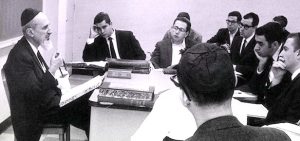The Soloveitchik Chumash – New Volume Released

With considerable embarrassment I offer this entirely unnecessary review. Unnecessary, because the previous two volumes of the Rav Soloveitchik Chumash were earlier introduced to readers of Cross-Currents. Those two reviews are the two witnesses who render all further testimony irrelevant – the fact of the excellence of this series has already been established. I should have written about the roll-out of the Vayikra volume weeks ago, but its writing became a casualty of the season’s frenetic activity and holiday preparation. There are still enough weeks left of Chumash Vayikra for the purchase of the volume to provide the student with his or her money’s worth.
This volume continues the excellent work of Dr. Arnold Lustiger in cobbling together commentary on Chumash Vayikra from all the places important thoughts were hiding among all the published works of Rav Soloveitchik. As in previous volumes, the full range of Rav Soloveitchik’s diverse audiences is represented in the selection. Some pieces are original and profound, and intended for the sophisticated reader. Others warrant inclusion because they express ideas that are well known, but conveyed so poetically that they penetrate more deeply. Different readers will find different passages to be the most significant to their personal preferences and needs.
To bring a bit of Torah light into the lives of our readers, I will include two excepts that might help get people in the mood to make the trip to the local seforim store, or guide the mouse to the appropriate place to click an order.
The first is a powerful insight into the nature of kares. Emphasis added by the reviewer:
17:10 If man wants to defeat death and scoff at nihility he must somehow elevate himself above this order of meaningless existence and come close to the order of eternity. To gain a pass to everlasting reality, he must represent God. He must remember God, become His shaliach, His ambassador. He must carry His message and convey it through action. He must become the medium through which God addresses Himself to the world: the instrument of revelation. The ideal of prophecy must find at least partial realization in all of us. This is possible only if the individual Jew includes himself in Knesses Yisrael, the community which was burdened at the dawn of history with the divine logos and ethos, God’s word and ethical system, whose historic existence is unconditionally consecrated to one goal only—the fulfillment of the covenant through a commitment to a singular modus existentis, a mode of existence willed by God. Only when the individual joins this community may he lay claim to a deathless existence. Only through identification with the origin may one gain eternal life. It is interesting that the term kares, cutting off—which, according to our Sages, refers to severance from the transcendental order of existence—is mostly linked in the Bible with the expression מעדת ישראל from the community of Israel (Ex. 12:19) or מקרב עמה, from among his people. Judaism identifies the termination of existence with cutting off the self from the community, for the individual strikes roots in eternity only by abiding within its confines.
Another passage takes the rough stone of the familiar topic of chok and polishes it till it sparkles:
18:4 (“You shall observe my chukim and my mishpatim…”)The chok may be said to possess two characteristics. The first is its universal immutability: the fact that a chok is independent of situational factors, changing philosophies and ideologies, or shifting practical and economic conditions. All these have no effect or bearing on a chok, which persists and retains its value under all circumstances, at all times and everywhere. Obviously, only an absolute faith in God as the Legislator of the chok could motivate such acceptance. Etymologically, the root ח-ק-ק signifies the act of carving, engraving, making incisions in a hard surface such as stone or metal….Such engravings are protected against the erosion of time and the elements. Used in religious law, the term signifies that the chok is characterized by perpetual validity and is engraven in the rock forever…. Nature’s laws are also chukim, unalterable and universal. The same Legislator instituted both systems of law, governing physical nature as well as man’s deportment….
The second characteristic of the chok is its incomprehensibility: it demands the surrender of one’s mind and the suspension of one’s thinking. It is a total commitment precisely because it requires an abdication of one’s reason. The commitment of a child to his parents, however fervent, is not total; it is rooted in the family setting and has many qualifications and reservations. A parent’s commitment to a child, however, is instinctive and total; it is irrational and therefore not contingent or conditional….
Although man is a rational being, the chok demands that he violate his reason. Laws which are based on intellect are vulnerable to modification, correction, or reinterpretation. The intellect is able to build and tear down, to create and to destroy; it continually reevaluates and postulates anew. The history of science is a chronicle of the construction and destruction of ideas, theories, affirmations, and negations. The chok, however, rises above human reason and motivation. A chok is unchanging because it is not subject to reason…. The religious Jew accepts the entire Torah as a chok, both in regard to its immutability and its incomprehensibility…The laws of the Torah are above place or time. The observant Jew never asks “Why?” in regard to mitzvah obligations. He may ask, “How is it performed?” or, “What lessons are to be derived therefrom?” but not, “Why?”
We perform all mishpatim (mostly social laws) in the same manner as the chukim. The Torah does not assign separate sections to the chukim and mishpatim; they are interspersed throughout Scripture. We make no distinctions between the two in the quality and totality of our commitment In our modern world, there is hardly a mishpat which has not been repudiated. Stealing and corruption are the accepted norms in many spheres of life; adultery and general promiscuity find support in respectable circles; and even murder, medical and germ experiments have been conducted with governmental complicity. The logos has shown itself in our time to be incapable of supporting the most basic of moral inhibitions. The Torah, therefore, insists that a mishpat be accepted as a chok; our commitment must be unshakable, universally applicable, and upheld even when our logos is confused. Without chok, ever social and moral law can be rationalized away, leaving the world a sophisticated jungle of instinct and impulses. Even a mishpat can endure only when it is sustained by an unmotivated commitment which is impervious to confusing circumstances.
Dr. Lustiger informs us of the particular difficulty in preparing this volume. Because there is little narrative in Vaykra, much more of the commentary is halachic – and keyed to two of the most abstruse areas of halacha – kodashim and taharos. Dr. Lustiger, despite his extensive background in learning, modestly decided that he needed extra help in wading through the Rav’s shiurim on these areas. So he enlisted the help of a sefer explicating Rav Soloveitchik’s shiurim on Maseches Kerisus by R. Yair Kahn of Yeshivat Har Etzion, aided by further assistance from Dr. Lustiger’s son, who learned kodashim at R. Tzvi Kaplan’s kollel in Yerushalayim, continuing on to Lakewood. It is a fitting testimony to the special quality of Rav Soloveitchik’s Torah that his words can bring together – as they should – the disparate flavors and preferences of Brisk, YU, the Gush, R. Tzvi Kaplan, and BMG. This is Torah as it should be.




An important note IMHO from another review:
While one could skim these works, they are better suited for thoughtful perusal. As Robert Louis Stevenson said,”One who goes touring on foot with a single volume in his knapsack reads with circumspection, pausing often to reflect, and often laying the book down to contemplate the landscape or the prints in the inn parlour; for he fears to come to an end of his entertainment, and be left companionless on the last stages of his journey.”
KT
it would seem that the passage on ‘chok’ would be a fitting coda to r shafran’s piece on holiness
Another important work by Prof. Kaplan, reconstructing The Rav ztl’s lectures of 65 years ago on Moreh Nevuchim, based on student’s 350 pages of notes has (finally) just appeared (part two yet to come). Unlike Dr. Lustiger’s chumashim, it contains not carefully assembled insights but thematically organized discussions on critical areas.